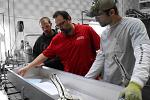- FMA
- The Fabricator
- FABTECH
- Canadian Metalworking
Categories
- Additive Manufacturing
- Aluminum Welding
- Arc Welding
- Assembly and Joining
- Automation and Robotics
- Bending and Forming
- Consumables
- Cutting and Weld Prep
- Electric Vehicles
- En Español
- Finishing
- Hydroforming
- Laser Cutting
- Laser Welding
- Machining
- Manufacturing Software
- Materials Handling
- Metals/Materials
- Oxyfuel Cutting
- Plasma Cutting
- Power Tools
- Punching and Other Holemaking
- Roll Forming
- Safety
- Sawing
- Shearing
- Shop Management
- Testing and Measuring
- Tube and Pipe Fabrication
- Tube and Pipe Production
- Waterjet Cutting
Industry Directory
Webcasts
Podcasts
FAB 40
Advertise
Subscribe
Account Login
Search
Report reveals conflicting opinions on skilled-labor shortage
- June 29, 2016
- News Release
- Shop Management
PwC has released “Upskilling manufacturing: How technology is disrupting America’s industrial labor force,” a report based on a 2016 survey of 120 U.S. manufacturers with emphasis on how advanced manufacturing technologies are affecting workforce dynamics.
According to PwC, while there is some concern over skills gaps, manufacturers are working to close those gaps. As manufacturers increase their application of advanced manufacturing technologies, their needs for more qualified talent become more pressing.
However, among the survey participants, skills shortages are not felt uniformly. On one hand, 33 percent of the manufacturers surveyed said they have no or only a little difficulty hiring talent to exploit advanced manufacturing technologies, while 44 percent report moderate difficulty.
On the other hand, 31 percent of manufacturers believe there will be a skills shortage in the next three years. Twenty-nine percent said it exists and will get worse. And 26 percent said the shortage has peaked and is improving.
One reason for the difference of opinion is that manufacturers differ in their understanding of the skills involved in the skills gap. Eighty-seven percent of respondents said they have had some difficulty in hiring talent to exploit advanced manufacturing technology, such as 3-D printing, IoT, and robotics. Seventy-five percent of factory floor jobs now are being filled by those with educations beyond high school.
Openings for manufacturing jobs continue to outnumber the number of hires by tens of thousands, but at the same time, U.S. manufacturing has entered an era of a workforce of historically few factory workers yielding greater productivity and output. Automation, more than off-shoring, is resulting in a diminished need for production and assembly workers, the report says.
subscribe now

The Fabricator is North America's leading magazine for the metal forming and fabricating industry. The magazine delivers the news, technical articles, and case histories that enable fabricators to do their jobs more efficiently. The Fabricator has served the industry since 1970.
start your free subscription- Stay connected from anywhere

Easily access valuable industry resources now with full access to the digital edition of The Fabricator.

Easily access valuable industry resources now with full access to the digital edition of The Welder.

Easily access valuable industry resources now with full access to the digital edition of The Tube and Pipe Journal.
- Podcasting
- Podcast:
- The Fabricator Podcast
- Published:
- 04/16/2024
- Running Time:
- 63:29
In this episode of The Fabricator Podcast, Caleb Chamberlain, co-founder and CEO of OSH Cut, discusses his company’s...
- Industry Events
16th Annual Safety Conference
- April 30 - May 1, 2024
- Elgin,
Pipe and Tube Conference
- May 21 - 22, 2024
- Omaha, NE
World-Class Roll Forming Workshop
- June 5 - 6, 2024
- Louisville, KY
Advanced Laser Application Workshop
- June 25 - 27, 2024
- Novi, MI






























